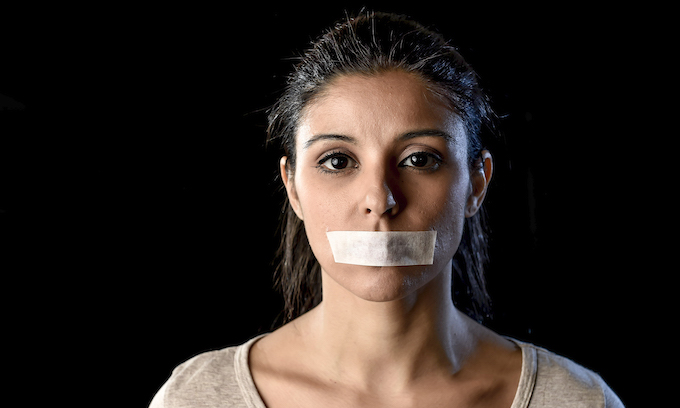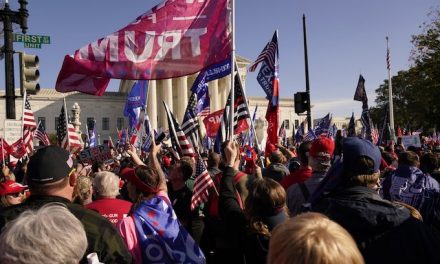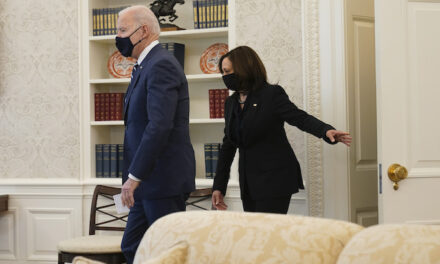The U.S. Supreme Court has ruled a Schuylkill County school district violated a student’s First Amendment rights when it punished her for an expletive-laden social media rant.
The court ruled 8-1 in favor of 16-year-old Brandi Levi, who argued the Mahanoy Area School District’s decision to suspend her from the cheerleading squad was an overreach of its authority because she posted the Snapchat message off-campus and on a Saturday afternoon using her personal smartphone.
GOPUSA Editor: In dissent, Justice Clarence Thomas wrote that he would have upheld Levy’s suspension.
Frustrated at not making the varsity cheerleading squad or getting the softball position she wanted and worried about final exams, the Schuylkill County teen posted a picture of herself and a friend with middle fingers extended and the text, “F— school f— softball f— cheer f— everything.”
Although Snapchat messages are automatically deleted after 24 hours, one of her followers took a screen shot of the post. Mahanoy Area School District suspended Levy from cheerleading after a coach saw her post.
The case has been closely watched because it is only the fifth case on student speech the Supreme Court has heard in the last 52 years. It has the potential to recast the court’s foundational decision that while students do not shed their right to free speech at the schoolhouse gate, educators have limited authority to restrict what they say inside the school wall.
Mahanoy Area School District argued that schools have always had the ability to discipline students for off-campus speech to prevent on-campus disruption. While the 1969 Tinker decision limits censorship of student speech to that which causes disruptions in the classroom, it places no limit on where the offending speech takes place.
The district also argued that the U.S. 3rd Circuit Court of Appeals, which covers Pennsylvania, New Jersey, Delaware and the U.S. Virgin Islands, is the only federal appeals court to rule that the Tinker decision doesn’t apply outside of a school setting.
Previous Stories:
Should an agency of government control an individual’s online speech? Courts to decide
Cheerleader’s profane Snapchat could define free speech off-campus
The district reasoned that fear of censorship doesn’t warrant a hard limit on schools’ ability to discipline students for things they say or write outside school. Other legal principles such as due process of law and fair notice that certain expression is prohibited guard against invasion of students’ privacy at home. Further, the Tinker decision bars schools from disciplining students because of disagreement with what they say.
The district also argued that preventing schools from policing off-campus expression would throw into chaos laws across the country requiring educators to address harassment, bullying or discrimination that infringes on other students’ rights or prevents them from accessing educational resources.
In the Tinker case, the Supreme Court ruled in favor of five students, including siblings Mary Beth and John Tinker, suspended by the Des Moines school district for wearing black armbands to protest the Vietnam War. The court found the First Amendment applies to public schools and that school officials may censor students only when their expression is disruptive to the educational process.
The Supreme Court has since found school officials can also limit student speech that is lewd or vulgar, that is inconsistent with a school’s educational mission and, most recently, that contains a message promoting illegal drug use when it upheld an Alaska high school student’s suspension for displaying a banner that read “Bong Hits 4 Jesus.”
Morning Call reporter Peter Hall
©2021 The Morning Call. Visit mcall.com. Distributed by Tribune Content Agency, LLC.
—-
This content is published through a licensing agreement with Acquire Media using its NewsEdge technology.



















Seems like a no brainer that a potty mouthed offensive outburst by some kid devoid of parental mentoring would be a champion of what liberals define as free speech.
THAT is a role for the PARENTS, not for SCHOOL (nor “big brother”).
THAT is the root of the 1st Amendment! Protecting speech with which one disagrees! If everyone thought/said the same thing, we wouldn’t NEED a 1st Amendment!
“I disapprove of what you say but I will defend to the death your right to say it.” -Voltaire
Exactly. WHILE I found What she said Reprehensible, for a teen to utter, SHE HAD THE RIGHT to say it, and not get punished by the school.
so, you are one of those that does not believe in free speech…please leave
So if I insult you about your appearance, sexual orientation, lack of ambition, military service rejection, government dependence, drug use, or criminal behavior, you consider that free speech? Look at the Trump years when under him there was incredible freedom of speech as evidenced by EVERY liberal source ridiculing, mocking , insulting, accusing, criticizing, or otherwise demeaning everything Trump said or did. And now? Free speech has disappeared by the continued thin skin of liberals who will do a hit and run of verbal attack and ZERO comment about Biden. Every late night TV host that fed off Trump is totally silent about Biden. And Biden is an endless well of gaffes, hate comments, lies, stupidity, and treason. Why are people so now terrified of speaking out against the current administration? And by the way, over 20 years of defending the constitution and its freedoms that the ungrateful and undeserving are now enjoying should not be answered by a demand to “leave”.
Nuke. YES that is free speech.. ITS to protect speech WE DO NOT LIKE.. Not what ‘we agree with”.
You are welcome to describe, in your defense of “free speech” common terms describing homosexuals, blacks, Hispanics, Asians, Muslims, Poles, Italians, women, handicapped, and on and on . . . .See how far you get from the liberals who made it an “in your face” crusade to abuse that right who now are the self-appointed thought police.
seems you are one of those that do not agree with our ways….leave then
So if I insult you about your appearance, sexual orientation, lack of ambition, military service rejection, government dependence, drug use, or criminal behavior, you consider that free speech?
That’s your opinion. It doesn’t make it so. Are you not entitled to an opinion?
I won’t tell you to leave, nuke. I think you should hang around and sort through this issue.
It seems to me that some people are confused by two things, the fact this is a minor child and she was using vulgar language.
I don’t like the language but the First Amendment was not written to defend popular language. It was written to defend language that others dislike. It was written to keep the Biden administration from controlling what conservatives say. Yes, even conservatives who are minors and who are pressured by their school NOT to support Donald Trump.
This just happened to be a bad word, there are also kids being pressured by schools for their political speech. This helps them too.
I say good for you, Brandi, and good for your parents that didn’t allow your school to run all over you. Now go wash your mouth out with soap.
Exactly leo.. the First amendment was designed to PROTECT folks, who said things, that many thought was bad/wrong, or insulting.. IT WASN’T designed to create echo chambers, where only thing you agree with, can be said.
Nuke, you would prefer to have the school discipline your kid for foul speech made off school grounds? Do you want them to come into your home and discipline your kids too?
I don’t know what her parent did about the foul language but her language is not nearly as important as her right to utter it, IMO. Yes, her parents should discipline her for using it but what she does off school ground is none of the school’s business.
Not at all. Parents should have been able to discipline their kids to make them decent citizens without intimidation from orwellian civil authorities or political correctness. In the mean time, I hear a kid with a mouth like a sailor in a brothel, and I marvel at the parental units that spawned that future societal loser.
Copy that. Just checking, that you didn’t agree with the school suspending her.
no its the liberals who tried to violate her right of free speech. I served in the military and was injured and so far have had 36 operations on my service connected injuries. But I will be damned if I am going to stand by and allow anyone to violate anothers constitutional right of free speech no matter who it is. The constitution says you have the right of free speech, it does not say that you shouldnt make a southbound part of a north bound mule of yourself or that people cant disagree with you, it just says they cant stop you from saying it. For example you have the right to walk into a bar and say something nasty to the prettiest girl in there, and her shaved gorilla looking boyfriend has the right to turn you inside out for doing it. Understand now?
If I would have gone on a foul mouthed rant like Brandi Levi, at 16 years old, I would have been grounded by my parents. With Brandi, we have one more foul mouthed liberal in society.
Why this ever got to the Supreme Court baffles me—I think their time would be better spent on matters worthy of judicial review such as election fraud which they refused to consider. How does this thing with this cheerleader rank higher in importance than the 2020 Presidential election fraud? Go figure.
The cheerleader incident is more of a personal morals matter. The school should certainly be allowed to discipline in such a case because the actions of this girl reflects badly upon the whole school, but she needs to develop a sense of good character and learn how to take available avenues through which to express her grievances without being so crass.
well, we are glad you are not in charge then
WHEN THE STUDENT LEAVES THE SCHOOL PROPE RTY AND IS NOT ATTENDING A SCOOL FUNCTION , SCHOOL ADMINISTATORS HAVE LITTLE OR NO AUTHORITY OVER THE STUDENT!!!!! AT TIMES THIS CAN BE LIKE WALKING A FINE LINE, BUT IN THIS CASE, THE SCHOOL FOLKS WERE TOTALLY OUT OF LINE JOE WERNLI
Just like if someone’s “Zoom calling” into a school lecture from inside their OWN house, the school shouldn’t suspend the kid, cause he had a TOY GUN in the backround (which iirc did happen).
I think their time would be better spent on matters worthy of judicial review
Seems to me that free speech is pretty worthy. The Founders must have thought so too since they put it in the FIRST Amendment not the last one.
That the Supremes took on this case is the headline, as far as I’m concerned. We object to the Supremes making laws from the bench, and taking or not taking a case is really the same thing. I don’t care about this cheerleader who will now be known for nothing but her foul mouthed rant, like that idiot kid from Florida. I do care that the court is apparently being told by the DNC what cases to take–and as they have since January, the court is following orders … scared to death of offending the Democrats for fear they’ll pack the court. Our whole damned country is going to hell.
SOT.. A first amendment issue, AFFECTS us all, just as voting does.
I’d rather they hear BOTH cases, not just one or the other..
Be it due to lack of clarity or misunderstanding, I seem to have inadvertently angered some of you. I’m not going to get in a back-and-forth over this, but I would like to clarify my point. Too much has been allowed into this country in the name of freedom. We are slowly being paralyzed by Communist, Socialist, Marxist, and Facist ideologies—and they can say whatever they want to say because of “free speech”. It has gone unchecked for so long that now Conservative speech is being threatened at every turn. Freedom has an irony in that if used without thought and responsibility, it will recoil like a snake and you suddenly find yourself no longer free. I respect and defend this girl’s freedom of speech, but she went about it in a very irresponsible way. Freedom isn’t license and liberty to allow anything and everything because some things will ultimately threaten it.
Whether a person thinks her speech was ladylike or that of a snotty little brat that didn’t get her way, who can blame her for saying what she did. Look at the fake manure pile of a president that’s sitting in the Whitehouse and dirtying his depends. He went on national TV and called a Ukranian a female dog. He also f*** to Obama on a hot mic. I don’t really find any fault with this teenager given the example of the potty mouth people that are running this country right now.
As imprudent as her comments may have been that is not the question being placed; the real crux of the matter is how far does the authority of the school over a student extend. There was a time when it was held schools acted in loco parentis, in place of the parent while at school with parents in agreement when education wasn’t as factuous as today, otherwise the parents were in charge of their children. This type of action by the school is invasive to the privacy of the family unit because it is outside the pervue of the school’s responsibility. This is close to the way bit tech stifles speech, no matter where or when, if they disagree with it. As of late school boards are using the same techniques on parents who challenge their education decisions. The limits of school authority need to be fixed, since social media is nearly omnipresent schools should have no jurisdiction over its content no matter how much they dislike it!
Exactly. Heck i’ve heard of businesses punishing workers, for stuff they said PRIVATELY WHILE out of work.
BOTH to me are MASSIVE over-reaches of power.